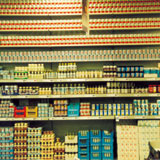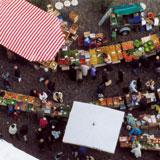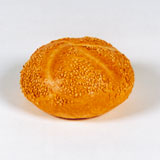Groceries
Groceries are sold at different prices in different supermarkets, grocery stores or markets. There are small to medium-sized grocery stores in nearly every neighbourhood.

There is a wider variety of goods on offer at the bigger supermarket chains. Many supermarkets have foreign specialities from the Mediterranean, Asia or Latin America. Most supermarkets have cash registers with a conveyor belt. Customers place their goods on the conveyor belt and then place a wooden or plastic bar across the conveyor belt to signify which items belong to them. A one euro coin or a chip of the same size is needed to use the shopping trolley in supermarkets. When the shopping trolley is returned the euro coin or chip is also returned. There is also another peculiarity at the fruit and vegetables section in supermarkets. In order to save personnel costs, the customer has to pick out the produce themselves and weigh it on the scales. This is how you do it: each type of produce is collected individually and placed in a separate bag. The number of the fruit or vegetable is written in front of each item. This number is keyed into the scales while the produce is on top and a small sticker with the price is printed. This is stuck on the bag and paid for at the checkout. It sounds more difficult than it actually is. It should also be noted that not all fruit and vegetables have to be weighed. Sometimes the price is written per item. If this is the case then "Stück" is written in front of the produce. If the price is written in kilos or grams, the produce must be weighed.
There are two main types of delicatessens: "Spezialitätengeschäfte" or "Feinkost-Geschäfte". "Feinkostläden" normally have produce from Germany as well as from many other countries, especially western European countries such as France, Italy or Spain. "Spezialitäten-Geschäfte" specialise on a certain country, like "Turkish" or "Korean" or "Italian" or "Indian delicatessen". These shops are mostly run by immigrants from the respective countries.

The weekly markets are very popular in Germany for purchasing fruit, vegetables, fish, meat and poultry. They normally take place once a week, often on Fridays or Saturdays, and usually take place outdoors on large squares. The times and location of the markets are advertised in local newspapers. Before closing, produce is often sold at cheaper prices or bulk discount is offered because the traders want to get rid of their produce.
These shops specialise in meat products. These are known as "Fleischerei"; in some regions, they are also referred to as "Metzgerei".
Bakeries sell bread, bread rolls and sweet pastries.

There is no other country in the world with such a wide range of breads and bread rolls as Germany. There are a total of 300 different varieties in the various regions of Germany. In many areas special breads are baked on special occasions. For instance "Easter Bread" ("Osterbrot") or "Wedding Bread" ("Hochzeitsbrot"), which is baked to bring the wedding couple good luck.
Elaborate, lavish cakes, sweets and pastries are made at special confectioneries ("Konditoreien") across the country.
Kiosks are often open late into the evening every day of the week. They sell newspapers, drinks, sweets and cigarettes as well as milk, coffee and bread. Kiosks have different names in different regions, like "Trinkhalle" or "Büdchen".
Drug stores ("Drogerien") sell articles of personal and household hygiene, such as shower gel, washing powder and toothbrushes, as well as cleaning articles such as sponges, washing-up liquid and clothes pegs. Cosmetics, groceries for diabetics and certain non-prescription pharmaceutical products such as herbal remedies can also be purchased there.
There are many special organic food shops in Germany specialising in "organically grown" produce. They are often called "Naturkostladen" and are also popularly referred to as "Bio-Laden" or "Öko-Laden". Here you can buy groceries and products that are free of synthetic pesticides and fertilisers and which are carefully processed. Meat comes from animals "that are raised humanly". However, "organic food produce" is also now commonly available in "normal" shops and supermarkets. The most important quality control symbols are "Naturland" or "Bioland". These "stamps of approval" guarantee the products’ origin and quality. However, not all products that use "Bio" in their name were really produced according to the strict organic guidelines.
Products that meet the Kosher and Islamic guidelines are generally only available in specialised shops.
Glass and other bottles or containers often have what is called a deposit ("Pfand"), or they are reusable ("Mehrweg"). The deposit is paid on these drinks bottles when purchased and refunded when the empty bottles are brought back. These are called deposit bottles ("Pfandflaschen"), reusable bottles ("Mehrwegflaschen") or reusable glass ("Mehrwegglas"). Drink cans and plastic bottles also have a deposit on them.

There are many restaurants with German cuisine and also a great and growing number of restaurants with foreign cuisine. These restaurants suit all price classes. (See ![]() Leisure).
Leisure).
Fried sausage ("Bratwurst") with French fries, ketchup and mayonnaise was Germany’s number one fast food dish for decades. This has now been replaced by the "Döner Kebab". There is almost no town in Germany that doesn’t have the kebab meat that rotates on a spit, and is sliced and served in Turkish bread. Immigrants from Turkey are responsible for making the "Döner" so popular. Apart from the "Döner", the "Bratwurst" sausage and French fries, the Italian "pizza" has also become a national dish in Germany. With just a telephone call, pizza delivery services ("Pizzaservice") deliver pizzas and other dishes straight to the home or office. Most larger cities also have fast food delivery services that offer various international dishes (Asian, south and north American, etc.).
